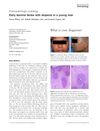 3 citations,
April 2016 in “International Journal of Dermatology”
3 citations,
April 2016 in “International Journal of Dermatology” A young man was diagnosed with trichoepitheliomas, causing thick skin and hair loss.
 9 citations,
January 1959 in “The journal of nutrition/The Journal of nutrition”
9 citations,
January 1959 in “The journal of nutrition/The Journal of nutrition” Higher potassium intake may protect against hair loss and liver fat in lysine-deficient rats.
[object Object]  April 2019 in “Journal of the Dermatology Nurses’ Association”
April 2019 in “Journal of the Dermatology Nurses’ Association” A 37-year-old man with hair loss and skin issues was successfully treated with oral antibiotics, highlighting the need for early treatment. Long-term care includes low-dose antibiotics and avoiding caps and wigs.
 September 2023 in “Stem Cells International”
September 2023 in “Stem Cells International” Substances from fat-derived stem cells can promote hair growth and counteract hormone-related hair loss by activating a key hair growth pathway.
 October 2022 in “Linköping University medical dissertations”
October 2022 in “Linköping University medical dissertations” The method shows hair testosterone levels reflect those in saliva, but are affected by various factors and may indicate a risk for heart attack.
11 citations,
January 2012 in “PubMed” Bimatoprost can help grow eyebrow hair.
2 citations,
March 2021 in “Reproduction” Finasteride may affect male fertility by interfering with specific sperm signaling.
 April 2012 in “Journal of the American Academy of Dermatology”
April 2012 in “Journal of the American Academy of Dermatology” Clofazimine successfully treated a man's ashy dermatosis, clearing his skin lesions.
 161 citations,
August 2013 in “Journal of experimental botany”
161 citations,
August 2013 in “Journal of experimental botany” Certain inhibitors slow down plant growth by causing early cell specialization without changing the cell development pattern.
Eating a lot of soy might lower the chance of early hair loss in men likely to get it.
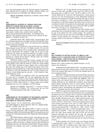 April 2012 in “The Journal of Urology”
April 2012 in “The Journal of Urology” Different prostate cancer treatments have similar risks of secondary cancers and related mortality when considering patient age and smoking history.
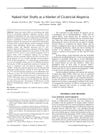 4 citations,
December 2017 in “American Journal of Dermatopathology”
4 citations,
December 2017 in “American Journal of Dermatopathology” Naked hair shafts are significantly associated with scarring hair loss and may help diagnose it, especially when multiple are found.
 6 citations,
December 2015 in “JAMA”
6 citations,
December 2015 in “JAMA” The woman's high testosterone levels indicated PCOS, leading to treatment that improved her symptoms.
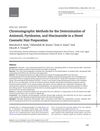 1 citations,
June 2020 in “Journal of AOAC INTERNATIONAL”
1 citations,
June 2020 in “Journal of AOAC INTERNATIONAL” Two new methods accurately measure Aminexil, Pyridoxine, and Niacinamide in hair products.
97 citations,
January 2020 in “Advances in chronic kidney disease” Calcineurin inhibitors, used in kidney transplants, can cause a wide range of side effects including kidney damage and other health issues.
October 2005 in “The Journal of clinical investigation/The journal of clinical investigation” Genetic manipulations that extend lifespan in mice may not work as effectively in humans.
 8 citations,
December 2011 in “Journal of Medicinal Food”
8 citations,
December 2011 in “Journal of Medicinal Food” D-004 may be a natural alternative to finasteride for treating enlarged prostate and male baldness.
 43 citations,
January 2016 in “International Journal of Andrology”
43 citations,
January 2016 in “International Journal of Andrology” Finasteride caused long-term sexual and non-sexual side effects in young men with hair loss.
 26 citations,
November 2016 in “European Journal of Clinical Pharmacology”
26 citations,
November 2016 in “European Journal of Clinical Pharmacology” Valproic acid helps delay hair loss and increases survival time for high-grade glioma patients undergoing radiation therapy.
 April 2023 in “Journal of Investigative Dermatology”
April 2023 in “Journal of Investigative Dermatology” Muscle around hair follicles controls hair loss by releasing a signal that causes cell death.
 11 citations,
December 2011 in “Biochemical journal”
11 citations,
December 2011 in “Biochemical journal” Neurotrophin-4 increases calcium current in specific mouse neurons through the PI3K pathway.
 53 citations,
May 1987 in “The Lancet”
53 citations,
May 1987 in “The Lancet” The document suggests a possible link between Crohn's disease and Johne's disease and calls for more research.
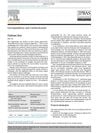 January 2017 in “Journal of Plastic Reconstructive and Aesthetic Surgery”
January 2017 in “Journal of Plastic Reconstructive and Aesthetic Surgery” The authors suggest using scalp hair follicles for beard reconstruction to improve results and reduce surgery time and patient discomfort.
 February 2024 in “Journal of Investigative Dermatology”
February 2024 in “Journal of Investigative Dermatology” Deleting NIPP1 in mouse skin cells causes early aging and chronic skin issues.
[object Object]  1 citations,
May 2021 in “BMC Proceedings”
1 citations,
May 2021 in “BMC Proceedings” The document concludes that more research is needed to reduce frequent hospital visits, addiction medicine education improves with specific training, early breast cancer surgery findings are emerging, nipple smears are not very accurate, surgery for older melanoma patients doesn't extend life, a genetic condition in infants can often be treated with one drug, doctors are inconsistent with blood clot medication, a certain gene may protect against cell damage, muscle gene overexpression affects many other genes, and some mitochondrial genes are less active in mice with tumors.
1 citations,
February 2024 HPV6/11 is often found in hair of men with anogenital warts, especially pubic hair, and can lead to recurrent warts.
2 citations,
February 2018 in “Journal of bone oncology” Low-dose chemotherapy is safer, more effective, and cost-effective than surgery for treating bone lesions in children.
 July 2022 in “Research Square (Research Square)”
July 2022 in “Research Square (Research Square)” Hair analysis can somewhat track past testosterone levels but is influenced by factors like hair washing, growth rate, sex, and hair color.
 4 citations,
January 2020 in “Journal of Cutaneous and Aesthetic Surgery”
4 citations,
January 2020 in “Journal of Cutaneous and Aesthetic Surgery” Keloid scars can form after hair transplant surgery and should be prevented and treated early.
9 citations,
April 2010 in “Lung cancer” Combining gemcitabine with paclitaxel is more effective than with pemetrexed for advanced lung cancer.






















